in-store offers
The Best Of 2017
Films

The votes are in, the numbers have been crunched and the films have been obsessively watched & rewatched & rewatched some more…Below is our comprehensive list of the best films of 2017 (based on DVD/Blu-ray release dates), as voted for by staff in all of our nine stores.
You can read about our favourite movies and records in more depth in this month’s Best of 2017 special edition of The Fopp List – available for FREE in all of our stores, right up until the end of January.
1. I, Daniel Blake
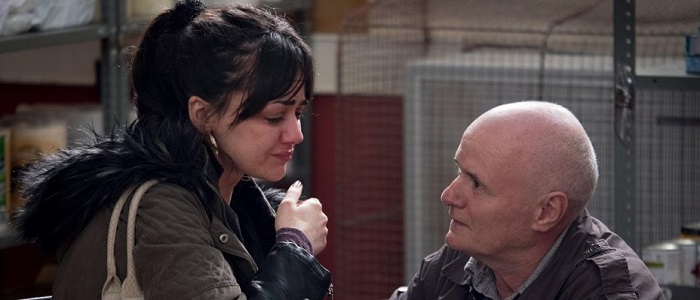
The poster for Ken Loach’s film carried a rousing image of lead actor Dave Johns with his left fist raised defiantly. As it transpired, this was no quiet rage against injustice – in this case, the UK’s benefits system – but a vital and deeply humanitarian call to arms that returned the 80 year-old director to the arena of British social outrage that he first occupied with Poor Cow and Cathy Come Home. The setting is Austerity Britain – today, in other words – where low income families are struggling to survive. Then there is Daniel, a joiner in late middle age who is recovering from a heart attack.
Advised by his doctor that he is not yet fit for work, he is obliged to sign on. Alas – computer says no, and Daniel finds himself in a Kafkaesque world of bureaucracy where he is forced to apply for jobs he can’t take in order to qualify for support. In scenes that are both heartbreaking and blackly funny, Daniel finds himself on the phone with a “healthcare professional” who will refer his case to a “decision maker”; faceless Orwellian administrators, in other words, whose jobs are defined by the ticking of appropriate boxes. During one soul-sapping trip to the Job Centre, Daniel meets Katie (Hayley Squires), a single mother who is barely scraping by.
His grandfatherly relationship with her children provides the story with a warm, emotional core; but also sets in motion another series of typically grim events. Loach’s film is not only one of his best – but also one of the most important British films made in a generation. A powerful crie de cour about the state we’re in – and how the country continues to let down its most vulnerable citizens. A masterpiece.
Michael Bonner
2. Moonlight

In many ways a film like no other, Moonlight is a kaleidoscopic experience. Opening in the crackriddled Miami housing projects of the 1980s, where an impressionable young kid falls in with an imposing yet gentle drug dealer, at first Moonlight suggests it is going to be a gangsta flick. But
in fact, Moonlight is less about reinforcing stereotypes than it is confounding them: covering three periods of its subject’s life, Barry Jenkins’ film lends a sincere voice to characters who have previously been marginalised or made quiet.
Focusing on three periods in the subject’s life – he is identified first as “Little” then “Chiron” and finally “Black” – Moonlight tackles universal themes including families and the ties that bind. But on a more intimate level, it is about what it means to be a black, gay man in contemporary America. Based on a play, In Moonlight Black Boys Look Blue by Tarell McCraney, Moonlight is a slow-burning chamber piece driven by its powerful, low key central performances.
Conspicuously, it is Alex Hibbert then Ashton Sanders and finally former athlete Trevante Rhodes who command our attention as the three incarnations of Chiron – Rhodes, particularly, carries a lot of the film’s emotional weight in his third act appearance during an emotional diner showdown with an old school friend (a sly and measured cameo from Andre Holland). But there is strong support too, from Mahershala Ali as Juan, the local drug dealer and Janelle Monae as his girlfriend, Teresa, whose role in Chiron’s upbringing proves increasingly significant. But the central relationship in the film is also the most difficult to measure: that between Charon and his mother Paula (superbly played by Naomie Harris), a drug addict, who initially pinballs between neglectful and smothering to, finally, developing a more nuanced, emotional connection with her son.
Michael Bonner
3. La La Land
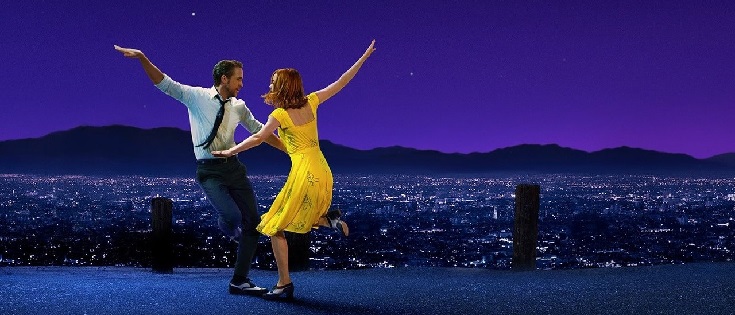
There’s a scene in Damien Chazelle’s razzle-dazzle musical La La Land where Ryan Gosling’s jazz pianist Sebastian asks his girlfriend Mia, an aspiring actress played by Emma Stone, “Why do you say ‘romantic’ like it’s a dirty word?” Indeed, as with much of La La Land’s handsome genre renovation, this is a knowing exchange. La La Land is a blissful love-letter to a golden age of Hollywood movies, full of big emotions, unselfconsciously joyous ideals and where true love is – surely – just the other side of an extravagantly mounted dance routine. Romantic and nostalgic are Chazelle’s watchwords.
There are mobile phones and drum machines – but although no one quite swings off a lamppost in the rain, to all intents and purposes this is 1952 and La La Land is an RKO musical in all but name. There is a scene set inside the Griffith Observatory high atop the hills of Los Angeles where Sebastian and Mia kiss, dance and then fly. Gosling and Stone are very much key to all this. This is their third collaboration together and they zing like a Hawks double act. Gosling strikes a good balance between rueful and wisecracking while Stone brims with wit and intelligence.
An early scene, where Mia bumps into Sebastian at a pool party where – humiliatingly – he is making ends meet playing keytar in a tacky Eighties’ covers band, is heroically funny. But they bring nuance to their characters, too. The plot – hokey but fun, admittedly – finds Sebastian struggling to reconcile art with commerce (very much A Star Is Born territory here) while Mia ploughs on with her own career. There are blue moments – the path of true love never runs smoothly – and sidesteps into pathos, but Chazelle’s sunny, good natured spirit prevails.
Michael Bonner
4. The Handmaiden
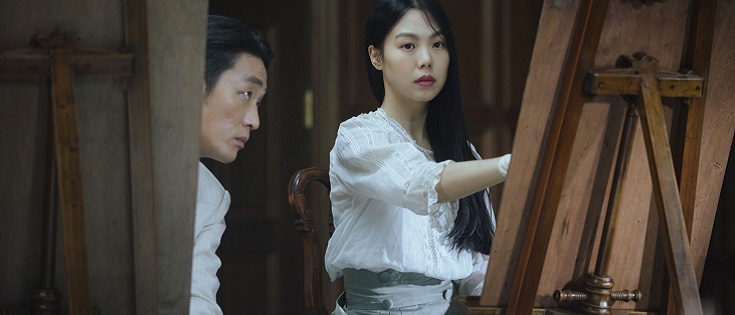
Park Chan-wook’s last film, Stoker, was a gothic melodrama set in a large, remote house complete with bodies in the freezer. Evidently, Park has a thing about rambling properties and lurid potboilers. Much of the action in The Handmaiden takes place in another unusual house – this one reputedly hauntedby a suicide. “Sometimes on a moonless night, my aunt’s ghost dangles from that branch”, we are told by wealthy heiress, Lady Hideko (Kim Min-hee).
Living on a remote, isolated estate, we learn that Hideko is to be married to her uncle. Meanwhile, a con man, Count Fujiwara (Ha Jung-woo), has embedded a new handmaiden among her retinue. It transpires that Nam Sook-hee (Kim Tae-ri) has been tasked with enticing her mistress to fall for this duplicitous ‘count’. As Lady Hideko’s relationship with the count develops, so a different relationship with Sook-hee emerges. “Each night in bed, I think of your face”, declares Lady Hideko as Nam Sook-hee unbuttons her mistress’ bodice. Adapted from Sarah Waters’ novel, Fingersmith, Chan-wook relocates the story from Victorian England to 1930s Korea.
The setting is puissant. Just as Korea was under Japanese colonial occupation during this period, so Lady Hideko and Nam Sook-hee are oppressed – not only by the uncle and the count but also by their traditional roles within society. Park’s film – which is excellent, incidentally – charts Hideko and Nam Sook-hee’s pursuit of liberation. Much as Lady Hideko’s house is a clash of Western and Japanese architecture that somehow coalesces, so The Handmaiden mixes classical, formal composition with Park’s typically twisted cinematic outlook. “Almost fully ripe”, says the count lasciviously, as he bites into a peach.
Michael Bonner
5. Manchester By The Sea

Fans of Bruce Springsteen’s haunting, blue collar reveries may well find themselves drawn to this, the latest film from director Kenneth Lonergan. There is guilt and loss and families rent asunder; all it requires for Boss aficionados is a haunting harmonica solo three quarters of the way through. Lonergan’s film finds Casey Affleck’s Lee Chandler working as a janitor in Boston when he learns his elder brother Joe (Kyle Chandler) has suffered a heart attack. Returning to his hometown of Manchester-by-the-Sea, Massachusetts, he finds his brother has died and he is legal guardian of his teenage nephew, Patrick (Ben O’Brien).
Lee has a past in Manchester – “a horrible mistake”, which casts a long shadow. He wrestles with his dysfunctional family in the past and struggles to find the best way to raise Patrick in the present. Cutting back and forth between the two timelines, Lonergan reveals the close sibling ties between Lee and Joe. We see Lee in more carefree days; and understand, perhaps, that the responsibilities of marriage and fatherhood are not well suited to some men.
There is a strong performance from Michelle Williams – which takes place largely in flashback – as Lee’s fiery wife. Intriguingly, Matt Damon was originally committed to play Lee and also direct Lonegran’s screenplay. Damon would have brought different beats to the role – but Affleck offers a strong, committed performance. Affleck has made a long career playing pinched, taciturn characters; men brought down by abject disappointments, humiliations and indignities.
There is Jesse James’ assassin, Robert Ford, murderous sheriff Lou Ford in The Killer Inside Me, the wronged outlaw in Ain’t Them Bodies Saints. In Manchester By The Sea we get a chance to see just how he got from there to here.
Michael Bonner
6. T2 Trainspotting

As a filmmaker, it isn’t immediately clear why Danny Boyle needs to revisit Trainspotting – his career has always been resolutely forward-looking. But perhaps for Boyle, like the rest of us, the lure of the past is hard to dismiss. There is considerable dramatic pull, too, in the central idea of a group of middle-aged men attempting to recapture their former glories. Boyle’s film finds his four main protagonists – Renton, Sick-Boy, Spud and Begbie – broadly unchanged since the first film.
This is their tragedy, of sorts. Sick-Boy plans to open a brothel with the proceeds from blackmail scams; Spud is scarred by endemic drug abuse; Begbie is in the middle of a lengthy prison sentence. Meanwhile, Renton appears to have fallen on his feet, living in Amsterdam where he sells stock management software for the retail industry. As T2: Trainspotting opens, events have conspired to send Renton back to Edinburgh, where he plans to somehow make amends. “So what have you been up to for the last 20 years?” The success of Boyle’s film is the way in which it understands the passage of time and the value of nostalgia.
The four men are brought together again – but the director is keen to show the downsides of middle-aged disappointment. There is a subplot that involves transforming a pub Sick-Boy inherited from his aunt into a high-class brothel; the setting is a rundown part of Leith that has so far defied gentrification. Like the four men themselves, the pub is a relic of another time. “I’m 47 and I’m fucked”, Sick-Boy admits.
Will we have to wait another 20 years for a third Trainspotting film? If so, I’d imagine it being like a swearier version of Last Orders – Fred Schepisi’s film about old friends reuniting for a funeral. In the meantime, T2: Trainspotting does a good job of honouring the original while finding something new to say about its roguish anti-heroes.
Michael Bonner
7. Toni Erdmann
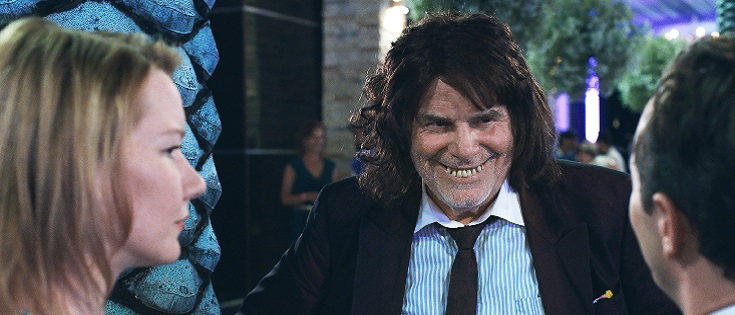
It’s had admittedly only a few entries so far, but there is a growing sub-genre of films devoted to difficult senior citizens and their frustrated progeny. There was Jack Nicholson in Alexander Payne’s About Schmidt, Bruce Dern in Nebraska (Payne again) and Bill Murray in Theodore Melfi’s St Vincent. Outside of Hollywood, though, there has recently been Hannes Holm’s A Man Called Ove in Sweden and Maren Ade’s sublime film, Toni Erdmann.
Such is the power of Ade’s Oscar-nominated tragicomedy that it has enticed none other than Jack Nicholson out of retirement to play the title role in an American remake. In Ade’s original, Peter Simonischek plays Winfried, a divorced schoolteacher with a fondness for practical jokes. He makes the misguided decision to travel to Romania to play a prank on his daughter, Ines (Sandra Hüller), a management consultant. Winfried’s fiendish plot involves arriving at her work dressed as his grotesque alter ego, ‘Toni Erdmann’, complete with false teeth and a wig.
Accordingly, he is revealed as a visual counterpoint to Ken Dodd coupled with the squirminducing lack of self-awareness of David Brent. The dynamic between father and daughter is well-played; she loved his japes as a child, less so as a professional woman, while Winfried appears to be teetering on the brink of an emotional collapse. The film asks, how does a parent stay relevant in their child’s life? And there is certainly a subtle pathos underscoring Winfried’s ghastly attempts to attract Ines’ attention.
Ines herself is clearly in need of a jolt: gradually losing sight of herself as she struggles in a male-dominated corporate climate. “I’m not a feminist, or I wouldn’t tolerate guys like you”, she tells her boss. A strong film, funny yet touching.
Michael Bonner
8. Get Out
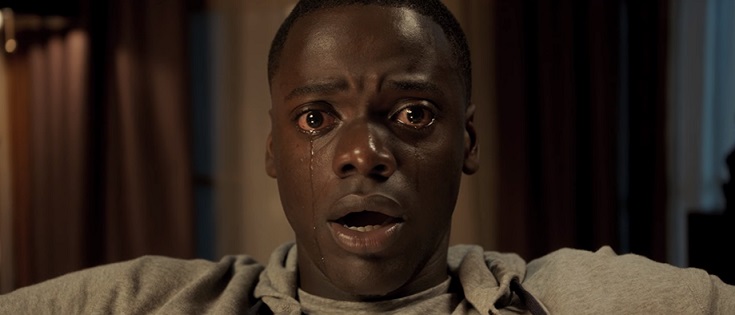
It’s been a remarkably good year for horror movies. While, at the back end of the year, Andy Muschietti’s adaptation of Stephen King’s IT has garnered acclaim as a very strong exemplar of the by-the-book horror yarn, 2017 began in a very different fashion. Together, films like It Comes At Night, A Ghost Story and even Personal Shopper signaled a new type of horror film – one predicated less around conventional shocks and instead following a more extraordinary, exploratory path.
Get Out, perhaps, is the best example yet of the post-horror film. It’s certainly the most successful – taking $252 million globally from a budget of $4.5 million. Part of the appeal of this brace of post-horror movies is the way they have moved fluidly between genres – is It Comes At Night a survivalist thriller, a lost-in-the-woods shocker or a dysfunctional family drama? Similarly, Get Out begins as a race satire like Guess Who’s Coming To Dinner? and ends up as something like The Wicker Man spliced with the post-modern body horror of Nicolas Winding Refn’s The Neon Demon.
It is written and directed by Jordan Peele, a comedian turned filmmaker, who here looks at the experience of Chris, a young black man played by British actor Daniel Kaluuya, when he is introduced to the parents of his white girlfriend, Rose, played by Allison Williams. It would be indiscreet of us to disclose what happens next – suffice to say, there is an extraordinary relationship between Rose’s family and their all-black staff. For all its jolts, Peele’s film has yet another strength that elevates it beyond a straightforward genre picture. In the era of Donald Trump and Black Lives Matter, it taps into America’s racial tensions in an unsettling and compelling manner.
Michael Bonner
9. Arrival

Denis Villeneuve exited 2017 on a high, following the remarkable success of Blade Runner 2049. For some, Villeneuve’s achievement was to make a film that at least equaled Ridley Scott’s much-admired original. But for those who had kept even a casual eye on the Quebecois director, the brilliance of his work on Blade Runner 2049 was only to be expected. Indeed, Villeneuve’s previous film – released almost a year before Blade Runner 2049 – was another high-concept highwire act that perfectly illustrated the filmmaker’s skills at combining spectacle with more romantic conceits.
Villeneuve is fortunate to have Amy Adams as his lead – is there a finer actress working in films today? Here playing a professor of comparative linguistics who is seconded by the military to help out after a dozen alien spacecraft land on Earth. She is partnered with Jeremy Renner, who plays a military scientist. Since The Hurt Locker, Renner’s career has been defined by doughty supporting roles in bigger franchise movies. Hawkeye, a second tier Avenger, a Cruise-lite IMF agent in the last two Mission: Impossible films or another betrayed operative in the Bourne series.
They’re all hewn from a similar, action-movie persona – good with weapons and a steely gaze – although at least in Arrival, he gets to show his wonkier side as a bespectacled scientist. Together, Adams and Renner are bound to communicate with the aliens; a tricksy proposition with an uneven cinematic precedent. For every Close Encounters Of The Third Kind there is Interstellar. But Villeneuve carries it off; the contact sequences manage not to be a letdown while there is a surprising and deftly handled third act departure into the realms of the visionary and supernatural. Villeneuve’s great skill is to take his audiences with him wherever he goes.
Michael Bonner
10. Raw

Raw, it seems, proved to be too raw for some cinemagoers. In September 2016, paramedics were called to a Toronto cinema after some audience members fainted during a screening. To some filmmakers, presumably this might be considered a badge of honour, although the response from French/Belgian writer/director Julia Ducournau has not yet been made public. Her film tells the story of Justine (Garance Marillier), a vegetarian, who becomes a cannibal at veterinary college. Her downfall begins during a student initiation rite – when she is required to eat an uncooked rabbit kidney. Her reaction prompts a whole new appetite; soon, her culinary explorations develop an intoxicating energy of their own. Elsewhere, you might find dead dogs, sedated horses and other uncomfortably hallucinatory images. An obvious antecedent is David Cronenberg, and particularly his early body horror experiments; but the medical set-up also recalls his mid-period masterpiece, Dead Ringers. The overwhelming urge behind Justine’s affliction recalls Abel Ferrara’s The Addiction.
Cannibalism was also just one of many transgressive elements present in Nicolas Winding Refn’s The Neon Demon, although there it is played out in a more lurid fantasia. While it’s hard to suggest that Ducournau’s film is less bonkers than Refn’s, she is at least a less self-conscious filmmaker; the horrors here are structured around Justine’s moral and ethical corruption. Meanwhile, from the striking opening shot of a car accident to the woozy, single-take sojourns through drunken student raves, Ducournau and cinematographer Ruben Impens lead us effortlessly into Justine’s underworld.
But Raw is not without humour, too. One scene, in particular, in which Justine and her partner-in-crime, Alexia, break into a flesheating fight, their classmate’s initial reaction is to pull out their phones and start filming the scrap before, eventually, they pull them apart.
Michael Bonner
11. Logan
12. Nocturnal Animals
13. Paterson
14. American Honey
15. Lady Macbeth
16. Captain Fantastic
17. The Childhood Of A Leader
18. The Salesman
19. Train To Busan
20. Elle
21. 20th Century Women
22. The Sense Of An Ending
23. Certain Women
24. Hunt For The Wilderpeople
25. Hell Or High Water
26. Under The Shadow
27. John Wick: Chapter 2
28. Silence
29. Swiss Army Man
30. Hidden Figures
31. The Unknown Girl
32. The Love Witch
33. Personal Shopper
34. Julieta
35. Fences
36. Jackie
37. Denial
38. Hacksaw Ridge
39. The Pass
40. War On Everyone
41. It’s Only The End Of The World
42. Prevenge
43. Fantastic Beasts & Where To Find Them
44. Free Fire
45. Gimme Danger
46. I Am Not A Serial Killer
47. Sully: Miracle On The Hudson
48. The Void
49. Don’t Breathe
50. I Am Michael
51. Frantz
52. Lego Batman Movie
53. O.J.: Made In America
54. I Am Not Your Negro
55. Wiener Dog
56. The Levelling
57. Graduation
58. Kubo & The Two Strings
59. A Monster Calls
60. Neruda
61. Their Finest
62. Transfiguration
63. Loving
64. The Eagle Huntress
65. Miss Peregrine’s Home For Peculiar Children
66. Lion
67. The Girl With All The Gifts
68. Ethel & Ernest
69. Christine
70. Lost In France
71. A Quiet Passion
72. Sing
73. Split
74. Heal The Living
75. Chi-Raq
76. Free State Of Jones
77. De Palma
78. A United Kingdom
79. The Other Side Of Hope
80. Rogue One: A Star Wars Story
81. The Girl On The Train
82. The Edge Of Seventeen
83. Whitney: Can I Be Me
84. Kong: Skull Island
85. Seoul Station
86. The Birth Of A Nation
87. Endless Poetry
88. The Lost City Of Z
89. Trespass Against Us
90. The Founder
91. The Viceroy’s House
92. Francofonia
93. George Best: All By Himself
94. Gold
95. Morgan
96. A Street Cat Named Bob
97. Beyond The Gates
98. Allied
99. The Infiltrator
100. The Light Between Oceans
